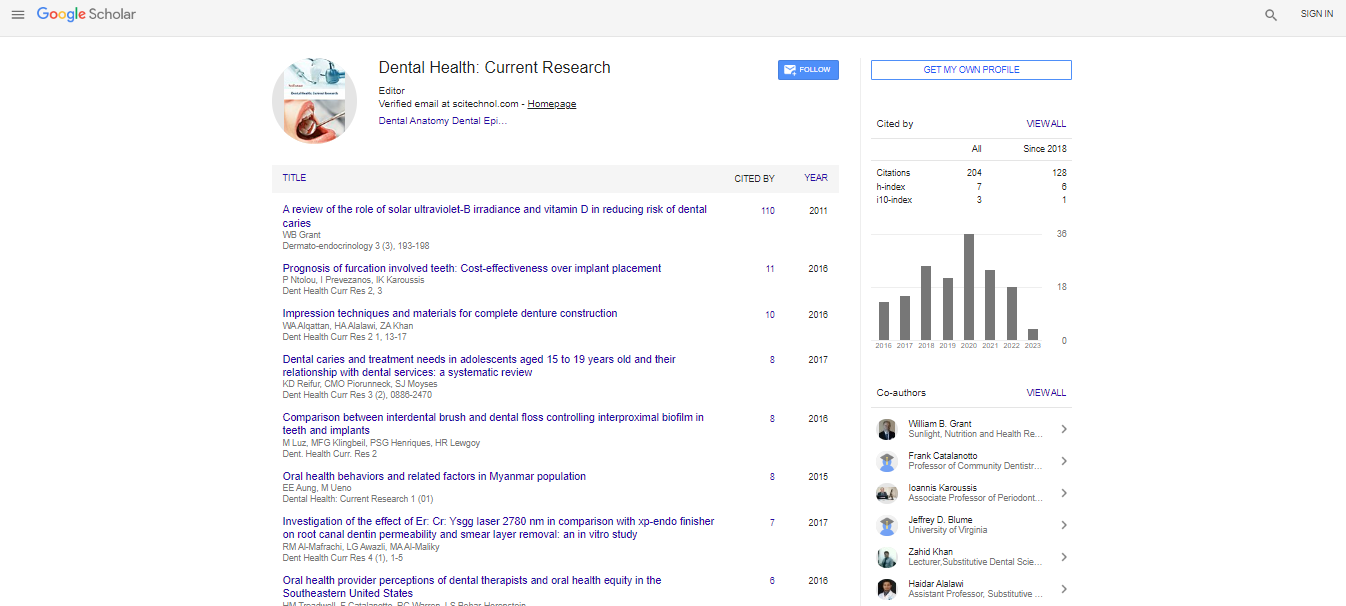Oral health as an integral part of primary care challenge of implementation in Saudi Arabia and GCC countries
Sahar Bin Huraib
King Saud University, KSA
: Dent Health Curr Res
Abstract
Dental disease is one of the great preventable public health challenges of the 21st century. Despite the availability of effective prevention and treatment methods, we have seen only small improvements in oral health status over the past few decades and among GCC populations, with prevalence rates up to 90%. Despite the overwhelming evidence reflected in the disease burden and unmet need, lack of access to proper dental care continues to be a pervasive issue, the cost of this “silent epidemic” is mounting with significant spending on restorative care for oral disease that could have been prevented, or if caught earlier treated, with lower-cost and lower-risk interventions. In KSA, as an example, health services are provided to all the population through governmental and private sectors but still there are difficulties to meet the proper dental care, which has historically been dissociated from health care, although oral health is integral to overall health and quality of life. Integrating oral health and primary care is difficult and requires access to dental providers, one of the factors contributing to oral health disparities. It can potentially solve a number of issues that contribute to the oral health crisis, especially with the movement towards vision 2030 and healthcare privatization, which will affect the access to oral healthcare. There are a number of barriers and practical challenges to achieving this goal. A critical challenge facing any attempt to integrate oral health and primary care is the current financing system for dental care. In addition, these challenges include conflicting practice models, workforce needs, gaps in stakeholder education, and financial issues. There is no gold standard approach to integration; each model has its own benefits and limitations. However, successful integration of oral health promotion in primary care necessitates a team approach, where oral health works within primary care take a “wholeperson” approach to health and wellness, and patients perceive that they are receiving dental services that are a routine part of their health care. As such, primary care is the ideal setting in which to deliver many of the education and self-care messages patients need to understand how they can reduce their risks for oral disease. A major issue affecting the implementation of most integration models is the current state of the workforce. There is a significant need to develop the primary care and dental workforces by providing future and existing providers with the skills needed in order for integration to succeed. To reduce the burden of oral disease, the efforts and skills of both primary care providers and dentists and their respective teams will be required. The job is too great for either discipline alone. Debating, creating new and expanding existing dental schools, with a central issue concerns the extent to which alternative dental providers, because of the potential role these providers can play in integrating oral health and primary care, especially in communities where there are few dentists, suggesting that alternative providers could both compensate for the serious shortage of dental providers in geographically isolated and low income areas. The presentation will discuss the challenges of future privatization and implementing collaborative and multidisciplinary oral healthcare teams working across the primary healthcare system in various settings, in KSA and GCC accordingly.
 Spanish
Spanish  Chinese
Chinese  Russian
Russian  German
German  French
French  Japanese
Japanese  Portuguese
Portuguese  Hindi
Hindi 